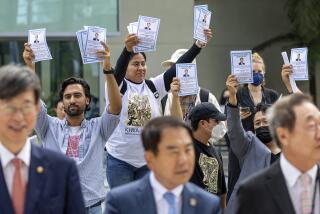S. Koreansâ Sentences Likely to Amount to Wrist Slaps
TOKYO â One day after South Korean tycoon Kim Woo Choong, the globe-trotting chairman of the huge Daewoo Group, was sentenced to two yearsâ imprisonment on a bribery conviction, he hopped on a plane to China for the grand opening of a Daewoo-built hotel.
That same day, Tuesday, Dong Ah Group Chairman Choi Won Suk, facing a 2 1/2-year bribery sentence, flew off to Libya for the completion ceremony of a huge waterway project in Tripoli, Libya.
A South Korean courtâs action Monday in sentencing Kim, Choi and two other top business leaders to prison for bribery--and issuing suspended sentences on five more industrial barons--would in American terms be roughly the equivalent of handing out jail time to the heads of General Electric Co., IBM Corp., Exxon Corp. and General Motors Corp.
But despite the image of a spectacular anti-corruption crackdown projected by the sentences, the actual impact in South Korea is likely to be far more mild than that of equivalent legal action in the United States.
Ultimately, the nine business moguls can expect their sentences to amount to no more than slaps on the wrist, partly because their convictions were peripheral to the corruption and sedition trial of former Presidents Chun Doo Hwan and Roh Tae Woo. To pin blame on the former presidents for corruption, prosecutors needed to go after some of those who gave them money. Chun was sentenced to death, and Roh received a 22 1/2-year sentence, but it is widely expected that both will receive reduced sentences or presidential pardons.
The continuation of business as usual for South Koreaâs most powerful businessmen is widely seen in Seoul as a clear indication that they are highly unlikely ever to see time behind bars and that their companies are likely to remain unscathed. Those who received jail terms are free pending the outcome of their appeals.
After all, the tycoons were convicted of practices that virtually everyone in South Korea admits were common to the relationship between almost all top business and government leaders throughout the 1980s. And Daewoo and the other targeted firms control such a large portion of the South Korean economy that the government simply cannot afford to punish them.
Jonathan Dutton, senior analyst at S.G. Warburg Securities Ltd. in Seoul, said he views the convictions and sentencing of the business leaders as âall a bit of a storm in a teacup.â
âItâs political posturing,â he said. âItâs Kim Young Sam showing that heâs in charge. . . . Itâs going to have minimal impact on any of these groups.â
Yet precisely because these practices were so common, the convictions mark an important symbolic step in South Koreaâs drive to integrate its business world more into the world economy, which requires a move away from business-government collusion toward a more genuinely open and competitive market system governed by law, not by connections and corruption.
Under the pressure of the more liberal trading and investment rules of the new World Trade Organization, South Korea is trying to bring its practices more into line with international standards.
Prosecution of the nine business leaders was meant to send a signal that the days are now gone when tycoons were expected--many would say required--to make under-the-table payments of political slush fund money to the nationâs president. Some are optimistic that the sentences have set a new standard for behavior of both government leaders and business people and that this mutual back scratching should end. For the tycoons to actually go to jail and for their businesses to suffer are not really necessary.
âNo longer is it required or acceptable for major business leaders to pay that kind of âdonation,â â said Tami Overby, executive director of the American Chamber of Commerce in Seoul. âAlthough itâs going to be a slow change, it will make things more transparent, and that is something the Chamber of Commerce has been pushing.â
For example, the U.S. business community is hopeful that the practice of deliberately leaving laws and regulations vague and open to bureaucratic interpretation will end.
âAny time you have something where the guidelines arenât clear and obvious and consistent, I think youâve opened the door to corruption,â Overby said. âI think as a result of all this there will be less corruption. Certainly that is our hope. We are overall very optimistic.â
The message is being broadcast from the highest levels of the South Korean government that this political drama will not be allowed to undermine the economy. President Kim himself, according to South Korean media, told ruling party advisors at a dinner meeting Tuesday, âI donât think the businessmen will experience any difficulties in their overseas activities because of the Chun-Roh trial.â
During the trial, the South Korean tycoons insisted that they merely made political donations under pressure. Those sentenced to jail terms must get court permission each time they wish to travel abroad.
In what was seen as a significant indication of the governmentâs intentions, this permission was readily granted Tuesday to Kim, Choi and Jinro Group Chairman Chang Jin Ho, who plans to visit Cambodia early next month to negotiate his firmâs participation in a Mekong River development project.
âIt is nothing more than a little inconvenience. My chairman must get court permission every time he makes an overseas trip, and he must drop everything and appear for trial when there is a court session,â Daewoo Group spokesman Lee Jung Seung said Wednesday. âOther than that, there are no limitations.â
Lee said neither Kim nor the firm is worried about the prison sentence, because they see the decision allowing Kim to remain free pending appeal as indicating that the sentence will be suspended by a higher court.
In a further indication that the government will not punish the business leaders entangled in the corruption case, a spokesman for President Kim said Wednesday that Daelim Group Chairman Lee Joon Yong and Daewoo Corp. head Lee Kyung Hoon, both of whom received suspended sentences, will accompany the president on a trip to Central and South America next month as scheduled.
âTheir verdict is not final, and the economic activities of businessmen are separate from politics,â the spokesman said. He also noted that earlier this year, during the trial, Daewooâs Kim had gone with the president on a trip to India and Southeast Asia.
The pressures on South Koreaâs giant business conglomerates, known as chaebol, extend far beyond domestic politics. They include rising labor costs, a domestic market gradually being pried open by American-led international pressure, competition from lower-cost suppliers such as China and Southeast Asian countries and difficulties in making a deeply desired transition to more sophisticated areas such as high technology. And this all comes in the context of slowing economic growth rates.
Given those pressures, South Koreaâs president simply âis not in a position to allow a further deterioration in the general environment for these companies to continue their investment projects,â said Jang Song Hyon, an independent international business consultant.
Moon Ki Hoon, an analyst at Ssangyong Securities, said another factor in the conviction of some business leaders on corruption charges was the governmentâs desire to issue a warning against illegal involvement by rich businessmen in next yearâs presidential election.
âThe president needed to assure the people that he would sternly deal with business sectors secretly supporting likely candidates with slush funds,â Moon said. âKim needed to be firm on the corruption issue, but later, in the name of minimizing economic impact, he will pardon the business leaders.â
Times staff writer Evelyn Iritani in Los Angeles and researcher Chi Jung Nam in Seoul contributed to this report.
More to Read
Sign up for Essential California
The most important California stories and recommendations in your inbox every morning.
You may occasionally receive promotional content from the Los Angeles Times.










